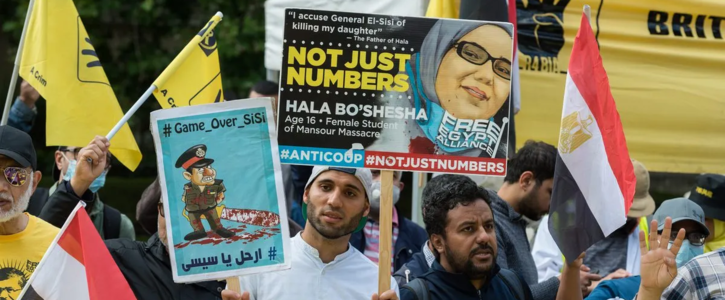500 signatures reached
To: New Zealand Parliament
Call on the Egyptian Government to end the death penalty

Being able to express our opinions, participate in our society and hold our politicians accountable for their actions is an essential part of democracy.
But in Egypt right now journalists, human rights defenders, unionists, students and peaceful protesters are being imprisoned and executed for speaking out against Egypts authoritarian regime.
With COP27, the International Climate talks, happening in Egypt this November, there is an opportunity for Governments around the world to put pressure on Egypt to end the death penalty and release all political prisoners.
We are calling on the New Zealand Government to use their diplomatic powers to call on the Egyptian Government to end the death penalty and release political prisoners.
But in Egypt right now journalists, human rights defenders, unionists, students and peaceful protesters are being imprisoned and executed for speaking out against Egypts authoritarian regime.
With COP27, the International Climate talks, happening in Egypt this November, there is an opportunity for Governments around the world to put pressure on Egypt to end the death penalty and release all political prisoners.
We are calling on the New Zealand Government to use their diplomatic powers to call on the Egyptian Government to end the death penalty and release political prisoners.
Why is this important?
In 2011, a civilian led movement held protests which resulted in the country’s long standing dictator President Hosni Mubarak resigning, and inspiring pro-equality and democracy movements around the world.
But democracy was short-lived. On July 3, 2013, a military coup ousted the democratically elected President. Since 2014, the person who led the military coup, who was the Minister of Defense at the time, Abdel Fattah Al-Sisi, has been the president of Egypt. Under President Sisi, people who have spoken out against his authoritarian government regime, including peaceful protestors and human rights advocates, have been arrested, executed and forced into exile. Mass trials of political opponents and reports of confessions forced under torture have become common place.(1,2,3)
A 2021 stocktake of the situation in Egypt by Amnesty International found that human rights are severely repressed in the country.
“Thousands of people, including human rights defenders, journalists, students, opposition politicians, business owners and peaceful protesters, remained arbitrarily detained. Dozens were convicted after grossly unfair trials or were tried by emergency courts on charges stemming from the peaceful exercise of their human rights. Enforced disappearances and torture continued unabated.”
In October and November 2020, official reports are that 57 people were executed, although a pro-government media outlet reported 91 executions, citing anonymous official sources, over the same period. Egyptian authorities do not inform families or lawyers in advance of executions and people often die whilst in custody as a result of cruel conditions including lack of access to medical care.(3)
Since 2013, hundreds of people have been killed in the streets, and the peaceful sit-ins that rejected the brutal coup were dispersed, resulting in massacres of civilians, the most famous of which were the Rabaa massacre and Al-Nahda massacre. (4)
Climate justice requires an inclusive approach to environmental policy that embeds human rights and tackles system problems, including social injustice, ecological destruction, corruption, and social and economic inequality. COP27 cannot deliver climate justice while ignoring the Egyptian Government’s human rights abuses.
Around the world in the lead up to COP27, people are taking action to call on their governments to use their diplomatic influence to join international efforts to push the Egyptian Government to end the death penalty and release the thousands of people who remain arbitrarily imprisoned.
But democracy was short-lived. On July 3, 2013, a military coup ousted the democratically elected President. Since 2014, the person who led the military coup, who was the Minister of Defense at the time, Abdel Fattah Al-Sisi, has been the president of Egypt. Under President Sisi, people who have spoken out against his authoritarian government regime, including peaceful protestors and human rights advocates, have been arrested, executed and forced into exile. Mass trials of political opponents and reports of confessions forced under torture have become common place.(1,2,3)
A 2021 stocktake of the situation in Egypt by Amnesty International found that human rights are severely repressed in the country.
“Thousands of people, including human rights defenders, journalists, students, opposition politicians, business owners and peaceful protesters, remained arbitrarily detained. Dozens were convicted after grossly unfair trials or were tried by emergency courts on charges stemming from the peaceful exercise of their human rights. Enforced disappearances and torture continued unabated.”
In October and November 2020, official reports are that 57 people were executed, although a pro-government media outlet reported 91 executions, citing anonymous official sources, over the same period. Egyptian authorities do not inform families or lawyers in advance of executions and people often die whilst in custody as a result of cruel conditions including lack of access to medical care.(3)
Since 2013, hundreds of people have been killed in the streets, and the peaceful sit-ins that rejected the brutal coup were dispersed, resulting in massacres of civilians, the most famous of which were the Rabaa massacre and Al-Nahda massacre. (4)
Climate justice requires an inclusive approach to environmental policy that embeds human rights and tackles system problems, including social injustice, ecological destruction, corruption, and social and economic inequality. COP27 cannot deliver climate justice while ignoring the Egyptian Government’s human rights abuses.
Around the world in the lead up to COP27, people are taking action to call on their governments to use their diplomatic influence to join international efforts to push the Egyptian Government to end the death penalty and release the thousands of people who remain arbitrarily imprisoned.

